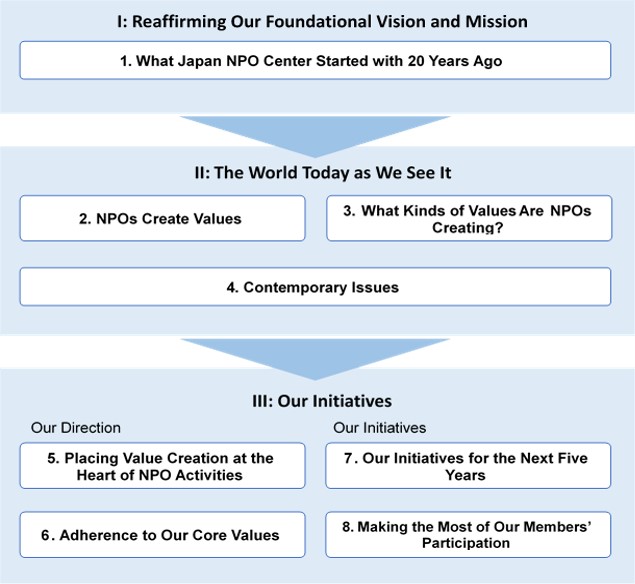After 20 Years, NPOs Are Poised to Focus on Value Creation — Publication of the JNPOC’s 2018-22 Five-Year Vision Essays: Civil Society in JapanVoices from JNPOC
Posted on September 10, 2018
In 2016, Japan NPO Center (JNPOC) celebrated its 20th anniversary (thank you to those who joined in the celebration!). This year, in 2018, the Law to Promote Specified Nonprofit Corporations (NPO Law) is having its 20th birthday. On March 19, the day when the law was enacted, JNPOC and two other organizations (C’s and Machi Pot) co-organized a symposium to commemorate the anniversary. Another day of celebration will be December 1, the date the law became effective. The three co-organizers will host another event in Tokyo on November 21, which will be the culmination of a series of events in different parts of Japan to reflect on the collective history of NPOs (nonprofit organizations) thus far and share our collective vision for the years ahead.
A 20-year celebration is a symbolic occasion – it is about growing out of adolescence, maturing, and becoming an adult who is, at least in theory, socially and economically independent. It is thus a time for us to reflect and ask ourselves what kind of adult the nonprofit sector has matured into.
Last year, when JNPOC started the year-long process of developing its five-year vision for 2018-2022, this was the question on our minds. What is the state of NPOs today? How is our collective health after 20 years? How is society treating NPOs these days? What are NPOs’ strengths and weaknesses? And what’s ahead for NPOs?
The result, JNPOC’s Five-Year Vision Paper, is titled “Placing Value Creation at the Heart of NPO Activities”. Although it is a forward-looking piece, a lot of time was spent reflecting on the questions above.

One change we discussed was the proliferation of actors who feel invested in solving a multitude of social issues. Whether the affected area is local or regional or global, and whether the issue is child poverty, elder care, disaster prevention/preparedness, community revitalization, gender equality, decent work or renewable energy, the government (national and local) and nonprofits no longer have a monopoly on offering solutions. A growing number of businesses and social enterprises have a stake in these issues, and are presenting (mostly market-based) ways to solve them. The UN-mandated SDGs (Sustainable Development Goals) are serving as an accelerator in changing business mindsets.
We also discussed how active citizens can bypass NPOs these days. Many socially-conscious individuals have various options to participate in social problem-solving without any particular organizational affiliation, largely thanks to innovations in information technology and social networking services.
With these changes taking place, we felt the need to re-visit what NPOs are all about and how they will be able to contribute to society and social change in the future. While we did not come up with the answer, we decided that an answer could be formulated around the concept of “value creation.” In essence, value creation is about how we identify and define what social issues deserve our attention before we reach the point of categorizing them as social problems and seeking solutions. It also means that NPOs should offer alternative views of how to depict reality. In the vision paper, you will see the following statements:
We will be even more conscious of the fact that values are continuously created through problem-solving activities, and we will convey the significance of this process.
The following activities serve as good examples of what we consider to be value creation by NPOs:
- Activities that allow NPOs to foresee and anticipate the manifestation of certain social problems, and to work to change the social structure that causes them
- Activities that are implemented through valuing people’s empathy and their participatory processes
- Activities in which the process for problem definition and evaluation of issues is shared among different stakeholders, which can then facilitate the explicit identification of specific challenges
With this vision paper in place, we are very excited, as well as humbled, by the prospects of NPOs and the significant role they can play in transforming the world today to a just and sustainable one. We invite you to read JNPOC’s 2018-22 Five-Year Vision, share your thoughts with us and join our collective efforts to create a vibrant and flourishing network of NPOs in Japan and around the globe.
Vice Chair,
Katsuji Imata
You can write to us from here.
Recent Articles
- A Place where People with Difficulties in Life Can Support Each Other: Valuing Loose Connections
- How They Give is Changing and the Implications for Japan’s Nonprofit Sector
- What Local NPOs Can Do to Prepare for the Next Disaster – Proposals from the 311 Change Association
- Should Only Education in School Count? ~ How Can We Protect the Dignity of Citizens? The Value of Civic Engagement is Questioned.
- Latest of the 20-year-old Tsutaeru Kotsu (Communication Tips) Series of Seminars Was Held
- Participants of Connected Disaster Prevention Program has exceeded 12,000